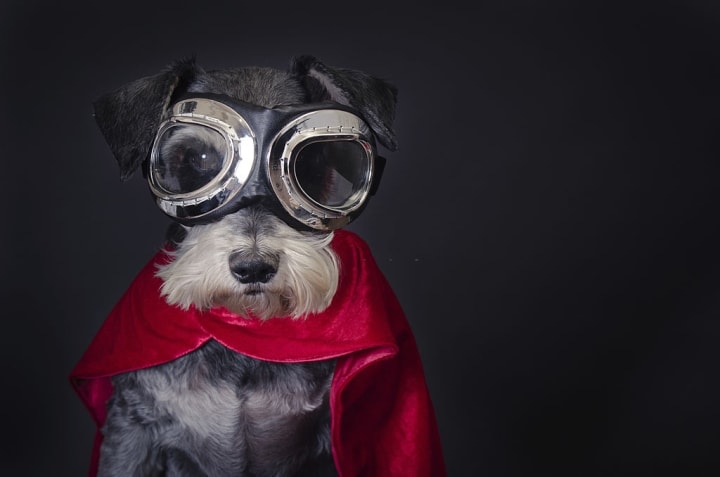What Your Dog Do When They Are Home Alone?
Some fun facts about dogs when they are home alone.

Your pup has only one thing to say as you step through the door: "You're home!" Home you are! I am so happy that you're home! But when you were out and about, what was he up to?
You can't ask him entirely, so we asked the experts. Here are some ways in which your dog spends his time alone and how to make it more pleasant:
He Takes a Naps Somewhere Cozy

Do you ever get home and find that there's a warm couch? Or find in your bed some telltale dog hair?
Start by setting simple guidelines while you're home if you don't want your pup on the furniture when you're out, advises licenced dog trainer Maxine Fox. It's likely that when your dog has a place for himself, he actually does not understand what is required of him.
She says, "It is just a matter of preparation and being reliable." "Most of the week you can't say, 'No dogs on the couch,' and then invite him up on Sunday [and] Mom can't say it's all right when Dad says it's not."
Then again, after seeing the car pull in the driveway, you might have a smart pooch who knows the rules and also knows he has 60 seconds to get off your bed. Fox advises simply shutting bedroom doors and putting barriers on furniture if that's the case. There are certain fights that you definitely can never win.
Sometimes He Rocks

Music is one of the best ways to relax and unwind for humans, but does your dog still appreciate the "Margaritaville" soothing powers? Leaving your playlist on when you're out may be a smart idea, according to a new report by the Scottish Society for the Prevention of Cruelty to Animals.
Researchers found that dogs who were listening to music displayed less signs of stress after evaluating heart rates, cortisol levels and behaviours. Reggae and soft rock were the most effective in terms of genre.
During the workweek, want to try this out on your pup? Start by making sure you play music around the house on a regular basis, suggests Melinda Berger, a professional dog trainer and behaviour consultant.
"If you just turn on music when you leave, it can actually cause dogs to get more nervous, because it means you're leaving them," she says.
Alternately, when you are out, she recommends books on tape to provide some relaxing "company".
He Watches His Favorite Shows

Just as some dogs love music, a little daytime TV helps some. Make sure that the TV is a familiar sight that your dog is used to, as with music, if you just turn it on before grabbing your keys, it might cause a negative reaction.
Animal Planet may seem to be a no brainer as to which channel to turn to, but note, those programmes were built with humans in mind, and some wild instincts may be stirred up by safari noises.
Alternatively, Berger suggests choosing something quieter (she keeps QVC on for her own pups). "Not because they're shopping! But on that channel, the sounds and excitement levels do not change, ” she says.
He Makes a Mess Around

When left alone, many dogs have a propensity to become aggressive, chewing up pillows, scratching doors, snacking on shoes.
"It's so, so normal," says Fox, whose customers sometimes complain of messes coming home. There are two things that always come down to it: is your dog nervous or is he bored? In any case, you want to approach it in a very similar way.
No two dogs are exactly alike, and there's no approach to one-size-fits-all. A lack of exercise, however, is quite often at the root of both anxiety and boredom problems, Fox says.
First and foremost, she advises ensuring that the exercise needs of your dog are met, bearing in mind that a 10-minute walk around the neighbourhood probably won't cut it. When you're away from home, dog food puzzles and interactive, treat-dispensing dog toys can also provide mental stimulation.
A visit to the veterinarian is to rule out any underlying health concerns if the disruptive activity is serious or starts unexpectedly.
He Bonds with His Buddies

Your dog wants to spend quality time with his favourite human as man's best friend. But when you're away, a furry companion can also enrich his day.
"You should probably add another social dog if you have a social dog," says Fox. "Find a perfect match, and it can be very helpful."
Shelter workers should be able to recommend dogs if you're fostering, which are consistent with your own pup and your work schedule.
He Waits for You

Dogs may not say time, however they know their routine, and they're upset when you skip your cue. Arrange for your dog to have some company if you're going to be away from home longer than normal.
"Hire a dog walker to come and play with your dog, or maybe a friend would like to do that," says Berger, who depends on a walker if she's more than four hours away. "For young , healthy dogs, doggie daycare is also a great choice."
Consider how much it would be difficult to get home in time if you're thinking about introducing a dog to your family. A happy, safe dog takes a big commitment to time, and it needs to be practical for prospective pet parents.
"Not everybody should have a puppy," Fox says. Are you ready to go home and walk your dog when you work for a long day and your colleagues go out? You just have to look at your lifestyle and at what you want.
What Experts Says About Dogs - How They Feel Alone?

Few dog owners want to leave their dog alone when they go off to work. Yet most dog owners have no idea how, after they have been left behind, their animals cope.
Now scientists have discovered how, after their owner leaves them behind, dogs spend up to half an hour howling, barking and moaning. And the agony continues for hours for certain pets. Two leading experts in canine behaviour have disclosed to MailOnline how dogs react to being left alone.
According to the experts, the first few minutes of isolation are the most difficult for a dog. Alice Potter, an RSPCA pet scientist, told MailOnline:' The separation reaction is seen shortly after the owner's departure, usually beginning within 30 minutes, and sometimes within the first few minutes.'
The most common behavioural indicators of separation-related behaviour are aggressive behaviour frequently aimed at the door from which the owner exits, different forms of vocalisations, defecating and urinating (howling, barking and whining).
Excessive salivation, self-mutilation, excessive behaviour and vomiting are other less common symptoms.' Dogs are most anxious right after you leave because, according to Dr. Emily Blackwell, a specialist in human-animal reactions from the University of Bristol, they have learned to adapt to the signals that you are leaving.
She told MailOnline:' The dog will know when the owner is about to leave the house - they will learn about items that are not regularly done before leaving, such as putting things in a bag, picking up keys, and putting the shoes and coat on.
These "cues" will be a predictor for certain dogs that something negative is about to happen which will make them nervous.
With these pets, they would appear to display signs of fear within 10 minutes of the owner leaving, which may include pacing around, moaning, howling, or scratching at the door.' The next few hours of being left alone depend on your pup's personality.
Dogs predisposed to anxiety can spend hours pacing up and down waiting for their owners to return.

Dr. Blackwell said:' Dogs with separation issues do not want to settle at all for long stretches, even though the owner has been out for many hours.
Usually, before getting up and going again, they spend less than a minute sleeping, so their rest is very disturbed and the dogs will also be exhausted when the owner comes home and only calm down at that stage to sleep.' She added that nervous dogs will constantly howl, only taking brief breaks to listen if their owner has returned.
Miss Potter said it's almost difficult to say before you leave the house whether your dog is going to be nervous. 'SRB is very much a secret problem, as it only arises by its design when the owner is absent,' she said.
It is recommended that all owners attempt to videotape their dog from time to time while they are left alone, just to ensure that they do not display a 'hidden' sign of distress, such as shaking, pacing or moaning.'
Previous research from the University of Bristol has shown that pedigree dogs suffer more from separation anxiety and are especially vulnerable to Labradors and retrievers. Dr Blackwell added that without their parents, young dogs are more likely to fail.
'As far as dogs with separation issues are concerned, at around two years of age, there seems to be a peak in the incidence of this condition, but dogs of any age will suffer,' she said.
Miss Potter said there are four easy steps to help your dog cope with your absence that you should try. If he has gone to the toilet or is destructive when you are out as likely to make him feel more insecure about being left alone and can hurt your relationship, it is vital not to punish your dog,' she added.
If they've been fed and exercised beforehand, the dog will be more likely to relax when left alone.'
ThankYou!
About the Creator
Anshul Singh Tomar
I can define myself as a Design Thinker with a diversified portfolio of portals which includes Ecommerce Reviews, Job/Career, Recruitment, Real Estate, Education, Matrimony, Shopping, Travel, Email, Telecom, Finance and lots more.






Comments
There are no comments for this story
Be the first to respond and start the conversation.